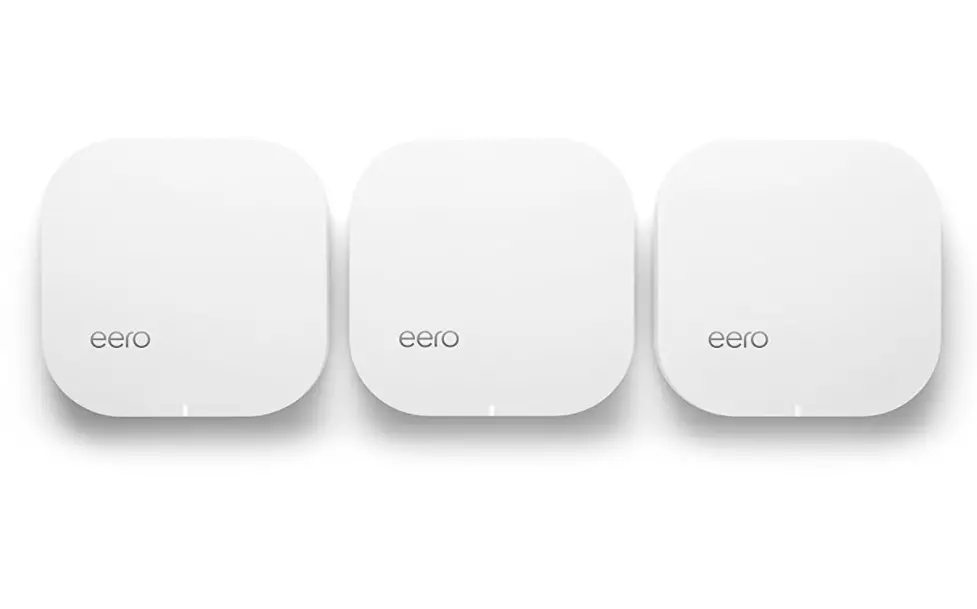It doesn’t matter how big or small your house or apartment is, the WiFi signal strength can vary dramatically depending on where you are using your smartphone or laptop. This issue is especially prevalent in larger homes, or homes with multiple stories. This is due to the way WiFi signals are broadcasted, along with the materials your home is built with.
WiFi signals usually don’t travel so well when faced with a solid material, like brick or concrete. The more corners or walls you have, or the more objects that are in the way of the signal, the worse your reception is going to get.
So how do you fix that problem?
This is where mesh WiFi router systems come into play, and with their increase in popularity, some of you might be wondering what they are if you should get one. So let us break that down for you.
What is a mesh WiFi router?
A mesh WiFi router is pretty much a router at its core. Think of a mesh WiFi router system as multiple routers that are all connected to your modem, but they all share the same WiFi network. They also work wirelessly which means that you can easily place them around your home to cover any dead spots without having to drag cables, which can be messy and troublesome for larger homes.
Mesh WiFi router VS range extenders
Now some of you might have heard of range extenders. These basically extend the wireless reach of your router. So why not a range extender instead of a mesh WiFi router? It is possible to rely on a range extender if you have a small home, but if you have a big home, range extenders might not be ideal.

This is because with range extenders, it can decrease your network speed. It can also create connectivity issues where depending on your location in the room or house, it might jump between the extender and the router, which in turn can interrupt your internet connection. Imagine walking from your bedroom while watching a video to your living room, only to have that stream interrupted halfway because of it switching from the extender to your router.
Why you should get a mesh WiFi router
In addition to the reasons we listed above, such as eliminating dead spots and also ensuring a more seamless connection compared to range extenders, there are other reasons to get a mesh WiFi router system.
This includes easy network management, where most mesh WiFi router systems these days come with accompanying mobile apps that makes managing the network simple and straightforward, and all of it can be done on your phone. Range extenders, on the other hand, don’t.
With these apps, users will be able to check their network’s performance, turn off WiFi access at certain access points, create guest networks, connect smart home devices, and so on.
Mesh WiFi routers are also “smarter” because unlike range extenders or your regular router, modern-day mesh WiFi router systems use algorithms and software to determine the best way to route your connection, with the goal of giving the user the best possible connection from where they are.
Downsides to mesh WiFi routers

Of course with all of its advantages, there are disadvantages and downsides to a mesh WiFi router system. The most obvious would be cost.
With range extenders, you could easily pick up a cheap one for yourself for about $20, but a mesh WiFi router system, like Google’s Nest WiFi, will be priced starting at $269. This is a significant step up in cost which some might not be able to justify.
Mesh WiFi router systems can also feel like overkill. As we mentioned, range extenders are great for small homes, so if you have a relatively small home, a mesh WiFi system could feel a bit too much. It also means you’ll have to deal with more equipment, whereas range extenders simply plug into a power outlet and you’re set.
What mesh WiFi routers to buy?
If you’re convinced that a mesh WiFi router system is the best setup for you, then you might be wondering what you should buy? There are plenty of options out there, so we have listed some of the more common and highly-reviewed models that you can choose from.
- Google Nest WiFi – $239 (2-pack)
- ASUS ZenWiFi AX – $329.99 (2-pack)
- Linksys Velop – $131.93 (2-pack)
- TP-Link Deco – $168.65 (3-pack)
- Netgear Orbi – $329.99 (2-pack)
NOTE: Links in this article may include affiliate codes that help us keep Phandroid up and running.